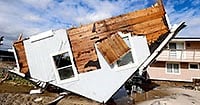Hurricane Sandy left New Jersey psychiatrists struggling to connect with patients. Power and...
Resilience is Most Likely Consequence of Disasters
Resilience is the norm for most people exposed to traumatic events, said Sandro Galea, M.D., Dr.P.H., chair of the Department of Epidemiology at Columbia University's Mailman School of Public Health.
“We read of the percentages of the exposed population that have PTSD or depression symptoms, but you almost never see that less than 50 percent have any type of pathology,” said Galea, at a recent conference on disaster preparedness. “The majority do not have physical or mental illnesses, so resilience should be one of the hallmark findings of 9/11 studies.”
Many of those studies have concentrated on rates of posttraumatic stress disorder (PTSD) among disaster survivors, but PTSD is not the only psychological effect of trauma. There were also significant rates of depression (about 10 percent) among exposed populations in New York after September 11, although that finding received less attention than those about PTSD. “Knowing what to expect from disaster—how much depression, PTSD, cardiovascular disease, cancer—is important for thinking about and planning for the next disaster,” said Galea.
To learn more about disaster mental health research and disaster preparedness, see Psychiatric News at http://pn.psychiatryonline.org/content/46/19/6.1.full and
http://pn.psychiatryonline.org/content/46/19/6.2.full.
And for an in-depth review of disaster mental health issues, see American Psychiatric Publishing's Disaster Psychiatry: Readiness, Evaluation, and Treatment at www.appi.org/SearchCenter/Pages/SearchDetail.aspx?ItemId=7217.
Many of those studies have concentrated on rates of posttraumatic stress disorder (PTSD) among disaster survivors, but PTSD is not the only psychological effect of trauma. There were also significant rates of depression (about 10 percent) among exposed populations in New York after September 11, although that finding received less attention than those about PTSD. “Knowing what to expect from disaster—how much depression, PTSD, cardiovascular disease, cancer—is important for thinking about and planning for the next disaster,” said Galea.
To learn more about disaster mental health research and disaster preparedness, see Psychiatric News at http://pn.psychiatryonline.org/content/46/19/6.1.full and
http://pn.psychiatryonline.org/content/46/19/6.2.full.
And for an in-depth review of disaster mental health issues, see American Psychiatric Publishing's Disaster Psychiatry: Readiness, Evaluation, and Treatment at www.appi.org/SearchCenter/Pages/SearchDetail.aspx?ItemId=7217.
(Image: Robert Adrian Hillman/Shutterstock.com)






